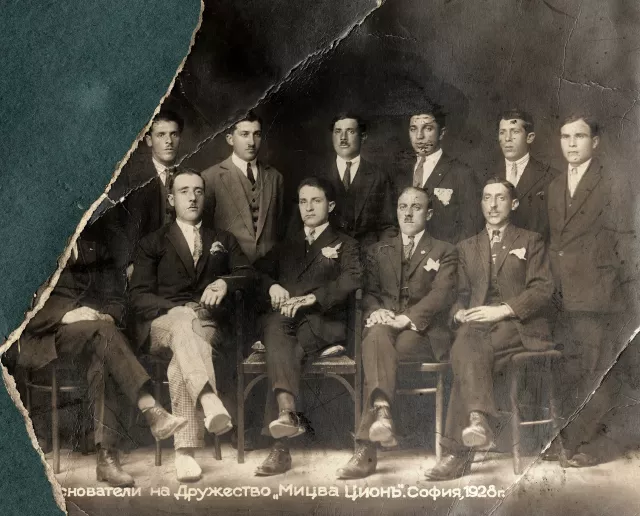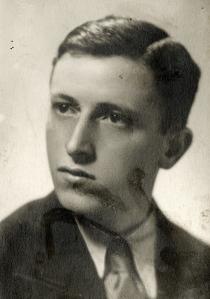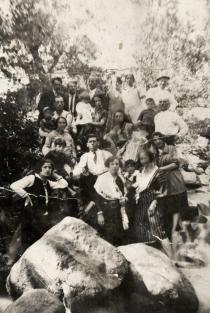The founders of the Jewish Mitzvah Zion society
This is a photo of the founders of the Jewish Mitzvah Zion society in 1928, among them is my father, Yosif Sabitai. He is the first one on the left. The third one from the left in the second row is my father's cousin, and next to my father are his close friends, Isak, Mordochai and Iliya.
This society engaged in charity and helped poor citizens of Jewish origin in Sofia. My father took part in the public life of Jews in Sofia. Together with the other well-off citizens of Jewish origin, he helped with the allocation of financial funds and different articles to his poorer compatriots through the Mitzvah Zion society.
Until 1944 we used to celebrate all the Jewish holidays, as we were supposed to. We celebrated Rosh Hashanah, Pesach, during the eight days of which we could eat only unleavened bread - matzah and boyo. [In the past poorer Jews used to make bread only with water and flour, without any salt and years , this was called boyo.] No bread was brought to the house [during Pesach]. For Pesach all kitchen utensils had to be replaced. Special utensils were brought out for the holiday and taken back to the basement for the rest of the year. My mother used to do the whole preparation for the holiday. She used to make pastry from matzah and she made the famous burmoelos, sweet or salty ones, from the saturated and squeezed matzah with eggs added to it, which we had for breakfast every day [during Pesach]. My mother would go out in the yard and cook burmoelos for us on a brazier. She also used to cook leek hamburgers, which we called leek-made friticas. Everything on the table was kosher. When a chicken had to be cooked, I was sent to the synagogue where the chicken had to be killed by the shochet.
Especially for Pesach, our house, being the largest one, was stripped of all its furniture - beds, wardrobes and so on - and all other families, living in our yard, would put a table in the empty room and gather there to prepare the meals necessary for the holiday. My father, who was the eldest, used to read the Haggadah in Ladino. We always had matzah, boyo and a special mixture, made of walnuts, some marmalade, dates and sultanas on the table. All these were mixed together and placed on a lettuce leaf. It was done for the welfare of the country, which was then Palestine. This meal was called acharosa [charoset]. When my father was reading the Haggadah a piece of matzah and boyo were wrapped in serviettes and given to us, the children, and we had to throw them over our backs in order to be ready to go to Palestine. Everybody had to eat from the meal mentioned in the Haggadah. On the following day my parents used to put their best clothes on and go to the synagogue. My mother would always put a hat on and my father, a long tallit, made of Shantung silk and a kippah.
My family used to celebrate Sabbath. My mother did the shopping and cooking on Fridays. On Friday nights the whole family gathered. The traditional meals like chicken, ritually killed in the synagogue, pastry with minced beef bought from the kosher butchery, and chicken soup or meatball soup from that minced meat were served. I remember that there was even one pear on the table, my father would cut it into four pieces and would give a piece to each of us, his children. On Friday night before Sabbath and on Saturday morning we used to go the synagogue. The atmosphere on Sabbath was always more special and more solemn than on other days. The table was always rich and full of kosher food. On Sabbath my father also used to read the Torah people's history in Ladino.
On Yom Kippur nothing is eaten until sundown. The last meal before the fast is at six o'clock the previous night. I remember that we, children, did not eat in memory of all who had died for Palestine (then). We, children, used to carry only a quince in our hand, which we were supposed to only smell and we had to show our tongues to prove that we hadn't eaten anything - when the tongue was white, it proved that you hadn't eaten and that you had endured the hours you were not allowed to eat.






































